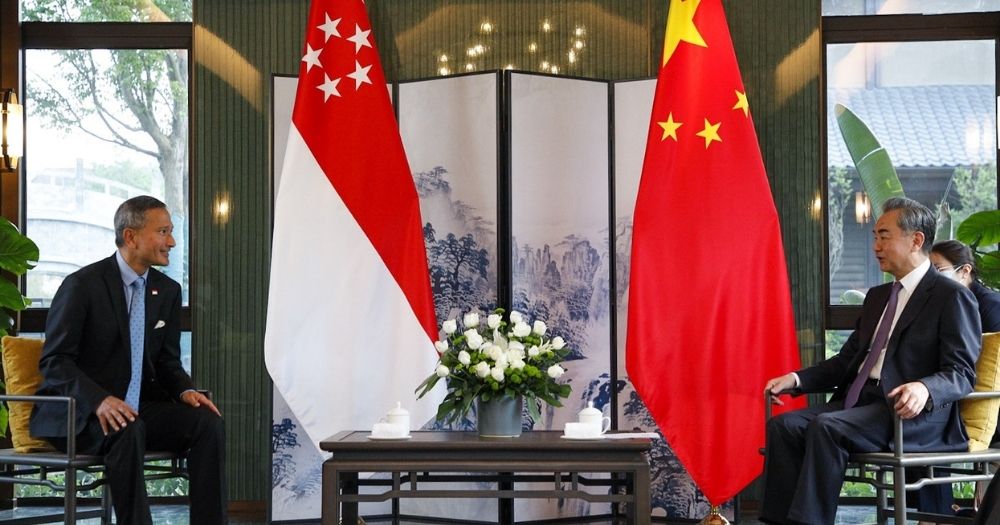Last week, China's foreign affairs minister Wang Yi hosted a series of meetings with four Southeast Asian foreign ministers in Fujian, China individually, including Singapore's Vivian Balakrishnan on Mar. 31 (Wed).
Warned Asean counterparts about "external forces" interfering in Myanmar
Wang met his Asean counterparts from Singapore, Malaysia, Indonesia, and the Philippines separately, and appeared to circle in on one common topic during their discussions -- Myanmar.
Following his meetings with the various foreign ministers, Wang told Chinese state media that they are aware that they need to be "alert to some external forces infiltrating Myanmar with ulterior motives", reported South China Morning Post (SCMP).
He added that these "external forces" may be provoking trouble and intensifying divisions, which could make the situation more complicated.
As the Myanmar military faces more international pressure and backlash for its increasing violence against anti-coup protesters, Wang called on Asean to be more vigilant against external forces in Myanmar.
He also shared his hope for the international community to "uphold an objective and fair attitude and create a favourable external environment for Myanmar’s domestic political reconciliation, instead of arbitrarily imposing sanctions and pressure".
China willing to coordinate and provide necessary assistance to Asean: Wang
Calling for all parties in Myanmar to "exercise restraint" and stop the ongoing violence, the Chinese foreign minister urged them to resolve the conflict through dialogue through a legal framework "as soon as possible".
He added that China is willing to coordinate with the Southeast Asian bloc and provide the necessary assistance.
After his meeting with Wang, Vivian shared that both Singapore and China agreed on the importance of respecting the "principle of non-interference in domestic matters" in Myanmar.
"Ultimately, the fate and the future of Myanmar lies in the hands of its own people. We can try to help -- Asean, the UN (United Nations) certainly tried to help -- in a constructive, non-interfering way, but in a way that allows dialogue to occur," Vivian said.
Visits by Asean ministers an important diplomatic signal for China
Dylan Loh, an assistant professor of public policy and global affairs at Nanyang Technological University told SCMP that he saw the visits by the Asean ministers as an important diplomatic signal, both domestically and externally.
"China wants to show that it has the support, friendship and backing of many countries -- this is significant as China comes under increasing diplomatic pressure from the West,” he said.
"It certainly does underline the diplomatic heft that China has in the region."
China's complicated relationship with Myanmar military
Analysts have opined that China's relationship with Myanmar's military is complicated at best.
Part of the reason why the military had agreed to embark on tentative democratic reforms in 2011 under the elected civilian government -- after five decades of military rule -- was to reduce its dependence on China by opening the country up to the rest of the world.
The military also reportedly had long-held suspicions towards Beijing for the latter's history of support for communist insurgencies and ethnic armed groups in Myanmar.
According to Nikkei Asia, the military had increased its imports of military assets from Russia in an attempt to offset its reliance on China.
The military does not want Myanmar to be "a client state of China," Murray Hiebert, a senior associate at the Center for Strategic and International Studies told The Washington Post.
In contrast, the civilian government had been relatively more responsive to infrastructure investments from China.
During Xi's visit to Myanmar in 2020, Aung San Suu Kyi inked a number of Belt and Road Initiative infrastructure deals.
Suu Kyi had also turned to China for support under increasing condemnation from Western nations over her defence of the Myanmar military's treatment of the Rohingya minorities.
Top image via Ministry of Foreign Affairs
If you like what you read, follow us on Facebook, Instagram, Twitter and Telegram to get the latest updates.
